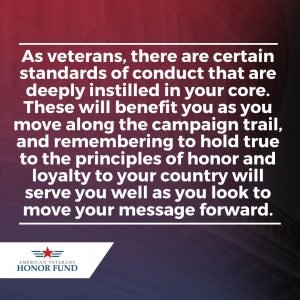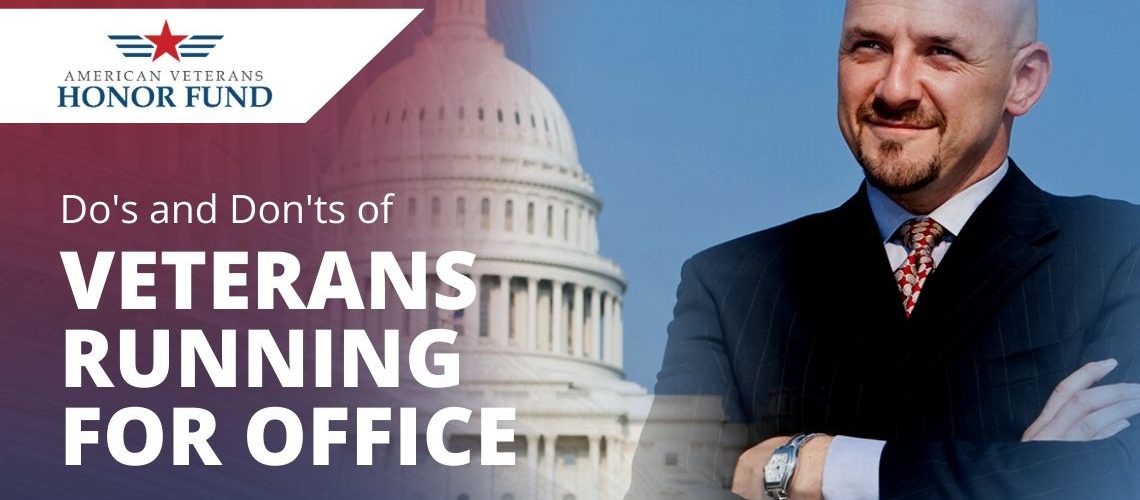So, you’ve made the big decision to make a run for office. Congratulations! Veteran representation is a statistic that must be improved, and every veteran choosing to throw their name in the hat is helping this number get to a higher place. As a veteran, you have several advantages right off the bat. Veterans are generally held in high regard and respect, which is a difficult thing to achieve in politics. In fact, confidence in the military has swelled among members of the public in recent years, while the approval rating and confidence in Congress has declined rapidly. What does this tell us? Veterans are much needed in government branches, as they are widely respected and offer a unique and balanced worldview that can be highly beneficial for a partisan government.
But if you’re new to politics, or even if you’re simply looking for some refreshers on what to do (and not to do) as a candidate, use this guide as a resource. As veterans, there are certain standards of conduct that are deeply instilled in your core. These will benefit you as you move along the campaign trail, and remembering to hold true to the principles of honor and loyalty to your country will serve you well as you look to move your message forward.
So, what are some important things to keep in mind as a veteran running for office?
DO tailor your message to resonate with more than just fellow servicemembers
Your military experience will be valuable for connecting with voters, but take care not to alienate those without military experience by using too much military jargon, over playing military experience, or catering too strongly to fellow servicemembers. Your political platform and message must resonate with a large number of voters in order to gain proper traction, so take the time to tailor it so that it reaches that large group. Not sure if your message is ready? Don’t be afraid to test it. Ask your friends on social media for their opinion, attend town hall meetings, hold small group meetings — test your message on a smaller platform before going for the “big show” so that you can ensure that the platform is suited for multiple demographics of voters.
DON’T wear the wrong outfit on the campaign trail

Generally, this concept goes without saying, but this wasn’t the case for a Navy SEAL who committed several faux pas during his run for a Congressional seat. Military protocol expressly forbid wearing a uniform to events such as political assemblies, which is unfortunately what retired U.S. Navy SEAL Floyd McLendon did when he attended a campaign kick-off event in Dallas. McLendon also kicked off his campaign in the wrong district, another detail that he missed in his preparation. These mistakes put McLendon at an automatic disadvantage with his voters, when his over two decades of service should make him an otherwise strong candidate for the seat. Take the time to familiarize yourself with all regulations concerning dress and attire for military members, lest you irk the servicemembers who would otherwise be your supporting voters.
DO watch your language
This should also go without saying, but it’s important to use tact and candor when speaking to others, both in person and virtually. This is something that many seem to forget: a comment made on the Internet lives forever, and even if it’s tempting to jump into a battle with a fellow user, it can have devastating consequences later down the road. Be sure to watch your language in all aspects of communication. Don’t post anything that you are worried could come back to haunt you at an inopportune time. Be respectful, and when in doubt say less and listen more.
DON’T go it alone
Campaign trails are tough roads, and they can often be lonely. Having a strong support system is vital for a campaign to have any modicum of success, and it’s foolish to think that you can achieve political success entirely on your own. Just as in the military, each man looks out for the safety of the next. Enlist the right people to help you — and this doesn’t mean giving your friends support roles on the trail. Find the people who have the expertise and the knowledge to move your campaign forward. Find people who don’t only agree with you but rather have their own opinions, too. Utilize resources such as Veterans Campaign or political action committees such as With Honor or Vote Vets to help establish your political skills and drum up support.
Running for office as a veteran is an honorable second service, and having more veterans in government positions is important for the ongoing health of our country. There are countless resources available to help you along the way, and soon you’ll find that the process doesn’t have to be complicated or difficult.
A strong support network is a vital ingredient to the success of a political campaign, and that support can come from the organizations whose primary purpose is the backing of veteran candidates. Fortunately, there are several organizations dedicated to the education, mentorship, and preparation of veteran candidates as they step onto the campaign trail. Check it out here.


